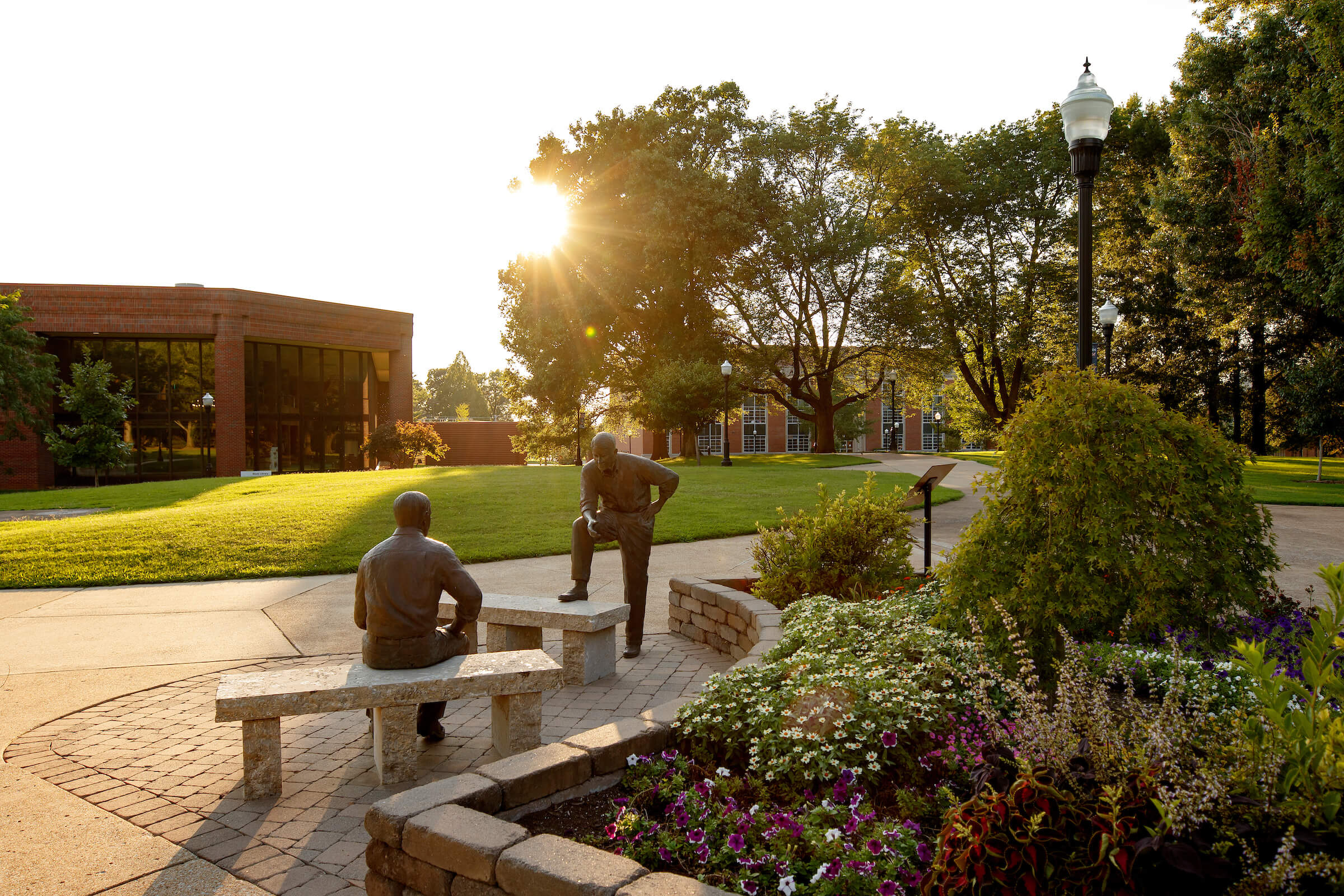We give personalized assistance to students as they navigate the process of transferring to UT Martin. Our dedicated admissions staff is available to answer any questions you may have, at any point along the way.

Start Your Application

Meet Your Admissions Counselor

Request Info
Admission Standards for Transfer Applicants
Admissions Requirements
- Students who have completed 12 hours of college-level courses must have a 2.0 GPA to be admitted.
- Students who have not been enrolled in a college for a semester or longer (excluding the summer) may be considered for admission on probation with less than a 2.0 GPA.
- Students with less than 12 hours of college-level courses will be considered for admissions based on high school GPA & ACT/SAT.
High School Curriculum
High School Unit Requirements
English: 4 units
Algebra I and II: 2 units
Advanced Mathematics: 1 unit of geometry, trigonometry, calculus, or advanced mathematics
Natural/Physical Sciences: 2 units; 1 must be a course in biology, chemistry, or physics
U.S. History: 1 unit
Social Studies: 1 unit of world history, European history, or world geography (may be fulfilled by completing 2 one-half units
Foreign Language: 2 units of same language (Waived for resident aliens if it is determined that English is their second language)
Visual/Performing Arts: 1 unit of theatre arts, visual arts, music theory, music history, vocal music, general music, or art history
- A transfer student with junior standing (minimum 60 semester hours) at the receiving institution is exempt from meeting the high school unit requirements.
- Transfer students with less than 60 semester hours who graduated from high school after 1988 are required to have the high school units in affect at the time they graduated.
- A transfer student may be admitted with deficiencies, but deficiencies must be removed beginning with the first semester enrolled and each succeeding semester until all deficiencies are removed.
- All deficiencies must be removed during the first two academic years of study or 60 semester hours (whichever comes first).
- Exception: the deadline will be extended until a transfer student has attempted 30 semester hours at UT Martin. The student must take the prescribed course(s) for removal of deficiency (deficiencies) each semester of enrollment, beginning with the first semester, until all deficiencies are removed.
- College credit will not be given for courses used to remove high school entrance deficiencies.
Transfer Credits
Learn how the courses you have taken at other institutions will transfer and can be used to earn a degree at the University of Tennessee at Martin.
- Transfer Equivalency Tables
- Transfer Equivalency Self Service
- Students wishing to appeal the evaluation of any transferred courses should contact the Office of Academic Records to request re-evaluation of those courses.
Tennessee Transfer Programs
Tennessee Transfer Pathways allows you to begin your college studies at a community college or similar two-year program and earn an associate degree, assuring that your credits will transfer to a bachelor’s degree program at any public university and many private universities in Tennessee.
The Tennessee Reverse Transfer Program is a process that allows transfer students who are currently attending a four-year school to combine four-year college credits with community college credits to receive an associate degree.
Academic Fresh Start/Forgiveness Policy
- Students who have been out of college for at least four consecutive calendar years qualify for the Academic Forgiveness Policy.
- If you think you qualify and you have not received this form in the mail, contact the Admissions Office at 731-881-7035.
- This must be done prior to enrolling in classes at UT Martin.
Residency Regulations
- Students who have graduated from a high school or obtained their GED outside of the state of Tennessee, will initially be classified as an out of state student for fee-paying purposes.
- Residency classification can be appealed by completing the Residency Classification Appeal Form and submitting required documentation.
Advising Contacts
College of Agriculture and Applied Sciences
Agriculture, Agriculture Business, Geosciences, and Natural Resource Management
Dr. Wes Totten, Department Chair (ftotten@utm.edu)
Veterinary Health Technology
Dr. Jason Roberts, Director (jrober29@utm.edu)
Family & Consumer Sciences
Dr. Keith Dooley, Interim Chair (wdooley@utm.edu)
Kim Stone, Program Resource Specialist (ksledd@utm.edu)
College of Business and Global Affairs
Accounting, Finance, Economics, Marketing, Management, and Information Systems
Jenny Killebrew, Advisor (jkilleb5@utm.edu)
Political Science
Dr. Paula Moore, Chair (pmoore44@utm.edu)
International Studies
Dr. Carrie Humphreys, Assistant Professor (chumph16@utm.edu)
College of Education, Health, and Behavioral Sciences
Behavioral Sciences majors, including Criminal Justice, Social Work, and Sociology
Dr. Justin Martin, Department Chair (jmart140@utm.edu)
Educational Studies
Dr. Clinton Smith, Chair (csmit279@utm.edu)
Health & Human Performance
Dr. Richard West, Department Chair (rwest37@utm.edu)
Melissa Morris, Program Resource Specialist (mmorri62@utm.edu)
Interdisciplinary Studies
Laurie Green, Advisor (lgreen14@utm.edu)
Nursing
Dr. Mary Radford, Department Chair (marye@utm.edu)
Psychology
Brian Johnson (bjohns24@utm.edu)
College of Engineering and Natural Sciences
Biological Sciences
Dr. Darrell Ray, Department Chair (dray5@utm.edu)
Chemistry and Physics
Dr. Robbie Montgomery, Department Chair (rmontgomery@utm.edu)
Computer Science
Dr. Bob Bradley, Interim Chair (jbradle4@utm.edu)
Engineering
Jeffrey McCullough, Interim Chair (jmccullo@utm.edu)
Benita Evans, Program Resource Specialist (bevans11@utm.edu)
Mathematics
Dr. Steve Elliot, Department Chair (eelliot7@utm.edu)
College of Humanities and Fine Arts
Communications
Dr. Robert Nanney, Department Chair (rnanney@utm.edu)
English & Modern Foreign Languages
Dr. Jeff Longacre, Department Chair (jlongac1@utm.edu)
History & Philosophy
Dr. David Coffey, Department Chair (dcoffey@utm.edu)
Melanie Warmath, Administrative Support (mwarmath@utm.edu)
Music
Dr. Jody Blake, Interim Chair (jblake17@utm.edu)
Visual and Theatre Arts
Sarah Haig, Chair (shaig1@utm.edu)
Other Contacts
Office of Admissions (admitme@utm.edu)
Regional Centers and Online Programs (outreach@utm.edu)
Dual Enrollment (dualenrollment@utm.edu)
Applying for Financial Aid
We offer one of the lowest costs of attendance in Tennessee and award more than $39 million in scholarships and grants each year. We help families navigate applying for financial aid and understanding just how affordable a four-year UTM degree can be.

Apply for Financial Aid

Cost of Attendance
